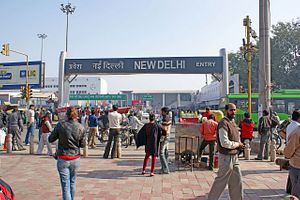What is the difference between New Delhi and Delhi? Should we continue to refer to them as two separate entities?
Contrary to the belief of some, New Delhi is not an independent or separate city located near the rest of Delhi, though it is a distinct entity. It is actually one out of the 11 districts that compose the city of Delhi. Central Delhi, otherwise known as Old Delhi, the historical capital of the Mughals, forms another of these districts. Numerous other ancient and modern cities such as Indraprastha, the earliest, are now situated throughout the modern city of Delhi.
Delhi was the historical capital of the Delhi Sultanate, the first major Muslim empire founded in northern India in 1206. It assumed this position because it lay at the gateway of the Ganges-Yamuna river valley from the direction of Afghanistan and Punjab, where most invaders into the subcontinent came from. It was thus both a terminus for one land route and a hub for land routes going east toward Bengal and south toward the Deccan. After the Mughals conquered the Delhi Sultanate, it became one of their main capitals, along with Agra and Lahore. The British originally ruled India from Calcutta, but moved the capital to the newly built district of New Delhi in 1911 because of the city’s symbolic value in India.
Due to Delhi’s long history as a capital or the site of multiple capitals, many named after the rulers who built them (for example, Tughlaqabad, Shahjahanabad), it does strike one as somewhat strange that the term “New Delhi” is used when referring to the capital of India. “New Delhi” is the term that most often appears in the datelines of news items and in reference to the government of India, both in India and in the rest of the world, in the same way as Washington, Beijing, and Moscow are used as metonyms for their respective countries.
But, in a way, this would be like calling the capital of the United States “Capitol Hill.” The entire city of Delhi, moreover, is a Union Territory under the Indian constitution, officially known as the National Capital Territory of Delhi. This region is jointly administered by a local government and the central government of India. Central government buildings are concentrated in New Delhi and the central government government of India has paramount jurisdiction over these buildings–thus over most of New Delhi.
But the Indian constitution itself merely declares the capital to be the “National Capital Territory of Delhi” (239AA), and subsequently refers to the area as Delhi throughout the document (similarly, in the Hindi version of the constitution, only दिल्ली is used). For example, the Supreme Court of India is said in the constitution to sit in Delhi, rather than in New Delhi.
Colloquial usage in India, moreover, lends itself to calling the entire capital simply “Delhi.” This is evident from conversation, casual usage in the media and in television (people almost universally say they are going to Delhi, not New Delhi), and proverbs, such as the well-known अभी दिल्ली दूर है/Abhi Dilli door hai (“Delhi is still far away,” which means idiomatically that a task or journey still far from completion).
So, based on the law and on tradition, should we continue to refer to the capital of India as New Delhi, or just Delhi?

































